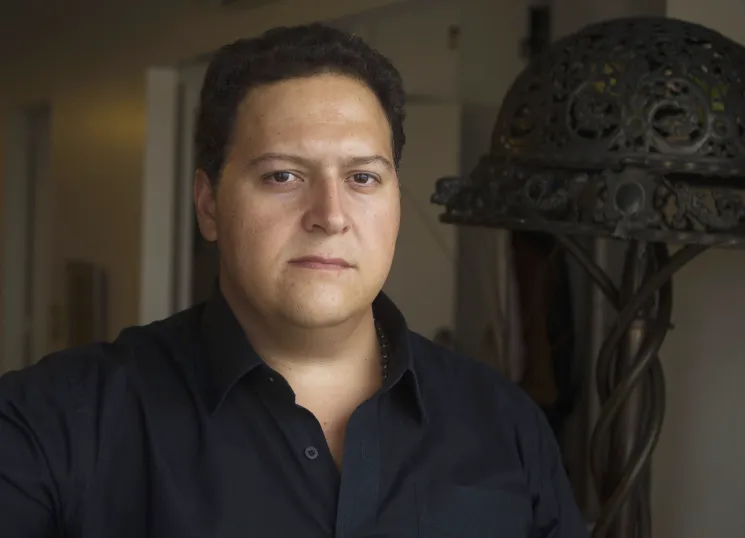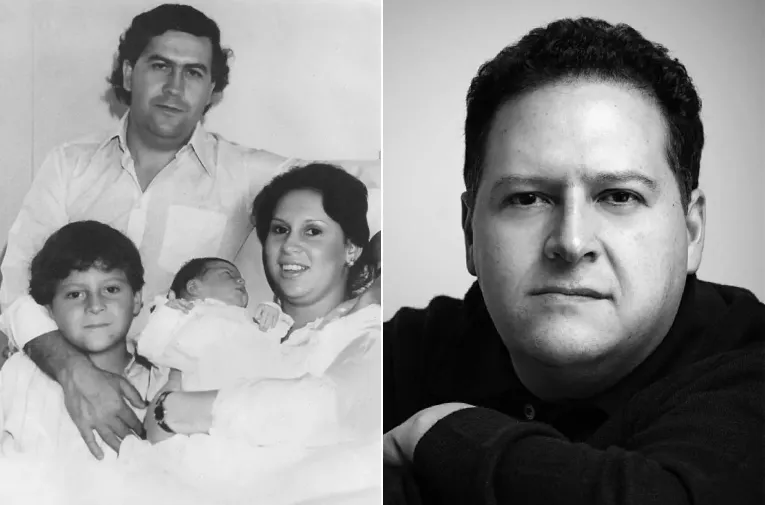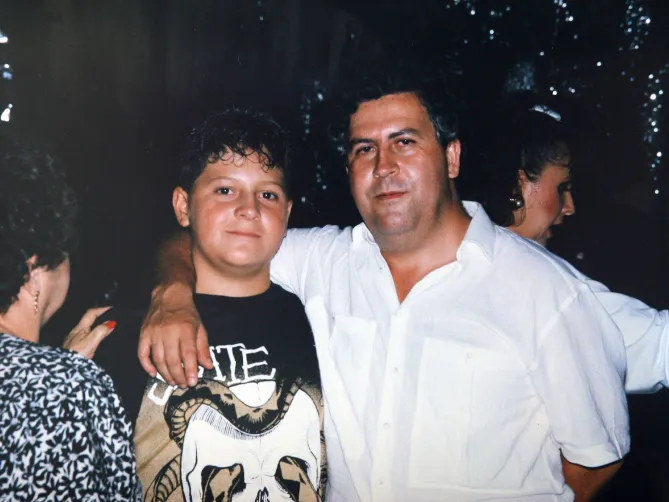Pablo Escobar’s son is Sebastián Marroquín. He was born as Juan Pablo Escobar Henao in 1977.
Sebastián Marroquín, formerly known as Juan Pablo Escobar Henao, is the son of the infamous Colombian drug lord, Pablo Escobar. Born in 1977, he witnessed his father’s rise and fall in the drug trade. Sebastián has since distanced himself from his father’s legacy, adopting a new name and identity.
He is now an architect, author, and public speaker. His work focuses on promoting peace and forgiveness, and he shares his unique perspective on the impact of his father’s criminal activities. Through his books and talks, Sebastián aims to educate people about the consequences of violence and the importance of reconciliation.
Pablo Escobar’s Bio
| Attribute | Details |
|---|---|
| Full Name | Pablo Emilio Escobar Gaviria |
| Nickname | The King of Cocaine, El Patrón, Don Pablo |
| Family | Wife: Maria Victoria Henao; Children: Juan Pablo Escobar (now Sebastián Marroquín), Manuela Escobar |
| Career | Drug lord, narcoterrorist, leader of the Medellín Cartel |
| Net Worth | Estimated at $30 billion (at peak in the early 1990s) |
| Body Measurement | N/A |
| Height | 5 feet 5 inches (166 cm) |
| Weight | Approximately 75 kg (165 lbs) |
| Gender | Male |
| Sexual Orientation | Straight |
| Age | Passed away at 44 years (December 1, 1949 – December 2, 1993) |
| Eye Color | Brown |
| Hair Color | Black |
| Body Type | Stocky |
| Relationship Status | Married to Maria Victoria Henao |

Who Is Pablo Escobar?
Pablo Emilio Escobar Gaviria, born on December 1, 1949, in Rionegro, Antioquia, Colombia, was one of the most notorious drug lords in history. Known as “The King of Cocaine,” Escobar controlled much of the global cocaine trade during the 1980s and early 1990s, amassing an immense fortune and infamy. He was the leader of the Medellín Cartel, a powerful and violent organization responsible for trafficking massive quantities of cocaine to the United States and other countries. Escobar’s impact on Colombia and the world was profound, as his operations fueled widespread addiction, violence, and social upheaval.
Escobar was born into a poor family and raised in Medellín, where he showed ambition from an early age. He started his criminal career by engaging in petty theft, smuggling, and eventually larger-scale operations, including trafficking contraband goods. However, his transition to cocaine trafficking in the 1970s marked a turning point in his life, as he quickly recognized the profit potential of the burgeoning drug trade. By the 1980s, Escobar had established the Medellín Cartel, which dominated the cocaine trade and smuggled enormous quantities of the drug, mainly to the United States.
Escobar’s wealth grew to unimaginable levels, and at his peak, he was estimated to be one of the richest people in the world, with a net worth of approximately $30 billion. His cartel’s operations included elaborate smuggling routes, distribution networks, and partnerships with various criminal organizations. Escobar’s wealth enabled him to influence Colombian society and politics profoundly. He adopted a Robin Hood persona in Colombia, where he funded housing projects, schools, and hospitals for the impoverished, earning loyalty from many of the local population.
Despite his philanthropic gestures, Escobar’s legacy was marked by extreme violence. Known for his brutal tactics, he employed sicarios (hitmen) to eliminate anyone who posed a threat to his empire, including rival cartels, politicians, judges, journalists, and law enforcement. Escobar’s ruthless strategy was summed up in his infamous “plata o plomo” (silver or lead) approach, offering officials a choice between bribery or death. His actions led to a period known as “La Violencia” in Colombia, a time of intense bloodshed and corruption.
Escobar’s downfall began in the early 1990s when Colombian and U.S. law enforcement intensified their efforts to dismantle the Medellín Cartel. After surrendering to authorities in 1991 under the condition of serving time in a self-built prison, “La Catedral,” he continued his operations until he escaped in 1992. A massive manhunt ensued, culminating in his death on December 2, 1993, during a raid by Colombian National Police in Medellín.
Pablo Escobar’s life and actions have since become subjects of extensive media coverage, including books, documentaries, and the popular Netflix series Narcos. His story serves as a stark reminder of the destructive power of the drug trade and its profound impact on individuals, communities, and countries.
Early Life
The early life of Pablo Escobar’s son, Sebastián Marroquín, is a story of contrasts. Born surrounded by wealth and danger, Sebastián experienced a unique childhood. This blog section delves into his early years, exploring his childhood memories and family dynamics.
Childhood Memories
Sebastián Marroquín, born Juan Pablo Escobar, had a childhood unlike any other. His early years were filled with luxury and extravagance. He lived in a mansion with a zoo and a private airport. Despite the luxury, his childhood was marked by fear and uncertainty.
Sebastián remembers playing with exotic animals and private jets. He often recalls the times he spent with his father, Pablo Escobar. They shared moments of joy despite the looming threats from law enforcement. These memories are a blend of happiness and tension.
Family Dynamics

The family dynamics in the Escobar household were complex. Pablo Escobar’s dual life as a loving father and a feared drug lord created a unique environment. Sebastián often saw his father as a hero and a provider.
His mother, Maria Victoria Henao, played a crucial role in maintaining family unity. She tried to shield her children from the harsh realities of their father’s world. The family faced numerous challenges, including constant threats and relocations.
Sebastián and his sister, Manuela, had to adapt to a life of hiding and secrecy. The family moved frequently to avoid capture, living in various safe houses. These experiences shaped Sebastián’s perspective on life and his father’s legacy.
Life Under The Cartel
Pablo Escobar’s son, following in his father’s footsteps, navigated a dangerous existence under the shadow of the notorious cartel. Let’s delve into the daily experiences and the constant threat of security and danger that defined life under the cartel.
Day-to-day Experiences
Living under the cartel meant constant fear and uncertainty. Routine activities were fraught with danger, with every move monitored and controlled.
Isolation from the outside world was common, as individuals lived within the confines of the cartel’s influence.
Security And Danger
Security measures were stringent, with armed guards and surveillance ensuring compliance and obedience within the cartel’s ranks.
Threats of violence loomed large, with repercussions for disobedience severe and immediate.
The Fall Of Pablo Escobar
The fall of Pablo Escobar marked a significant turning point in history. This notorious Colombian drug lord’s death sent shockwaves through his family and the entire nation. His reign as the head of the Medellín Cartel came to a dramatic end. The consequences for his loved ones were profound and far-reaching.
Impact On The Family
Pablo Escobar’s death left his family in turmoil. They lost their protector and provider. His wife, Maria Victoria Henao, and their two children faced immediate danger. They were targets for his enemies and law enforcement.
The family had to leave Colombia to seek safety. They sought refuge in various countries, living in constant fear. The stigma of being related to Escobar followed them everywhere. His son, Juan Pablo Escobar, later changed his name to Sebastián Marroquín to escape his father’s shadow.
Survival Strategies
Survival meant staying hidden and using aliases. The family adopted new identities to blend in. Sebastián Marroquín focused on education and personal growth. He distanced himself from his father’s legacy.
Writing became an outlet for Sebastián. He penned books detailing his experiences, offering insights into life as Escobar’s son. This transparency helped reshape public perception.
| Strategy | Description |
| Relocation | Moved to different countries for safety |
| New Identities | Changed names to avoid detection |
| Education | Pursued higher education to rebuild life |
| Writing | Authored books to share his story |
Despite the challenges, Sebastián Marroquín found ways to survive. His resilience is a testament to human strength. Pablo Escobar’s fall drastically altered his family’s life, yet they managed to endure and rebuild.
Life In Exile

Pablo Escobar’s son, Juan Pablo Escobar, faced life in exile after his father’s death. This transition was filled with numerous challenges and required significant adjustments. Discover how he overcame these obstacles and adapted to new cultures.
Relocation Challenges
Juan Pablo faced numerous challenges during his relocation. Moving to a new country took work. He had to leave behind his home, friends, and familiar surroundings. The first hurdle was finding a safe place to live. Safety was a priority due to his father’s legacy.
Another significant challenge was financial stability. They had to start from scratch. The family lost most of their wealth after Escobar’s death. Legal issues also posed a threat, making it difficult to settle.
| Challenge | Details |
| Safety Concerns | Finding a secure place to live. |
| Financial Stability | Rebuilding their financial status. |
| Legal Issues | Navigating through legal threats. |
Adapting To New Cultures
Adapting to new cultures was another significant aspect of Juan Pablo’s life in exile. Learning a new language was the first step. It helped him communicate and integrate better into society.
- Language Barriers: Learning new languages was essential.
- Cultural Differences: Understanding and respecting new customs and traditions.
- Building Relationships: Making new friends and allies.
Understanding the local customs and traditions played a crucial role. It helped in gaining acceptance within the community. Building new relationships was also vital. Forming new friendships and allies provided emotional support.
Juan Pablo’s resilience and adaptability helped him overcome these challenges. His journey in exile is a testament to his strength and determination.
Identity And Legacy
Pablo Escobar is a name synonymous with crime and wealth. His son, Juan Pablo Escobar, carries a heavy burden. The identity and legacy of being an Escobar influence his life daily.
Living With The Escobar Name
Living with the Escobar name is challenging. Juan Pablo, now Sebastián Marroquín, faces constant scrutiny. He works hard to distance himself from his father’s legacy.
Despite his efforts, many still associate him with his father’s crimes. He has written books and given talks to share his perspective. He aims to promote peace and reconciliation.
His new name, Sebastián Marroquín, symbolizes a fresh start. Yet, the shadow of Escobar’s past looms large. His work focuses on creating a new narrative for his family.
Public Perception
The public’s perception of Juan Pablo varies. Some see him as a victim of circumstance, while others view him with suspicion, doubting his intentions.
He uses his platform to speak against drug violence. His message is clear: learn from the past and build a better future.
Public opinion is divided. Many admire his courage to speak out. Others remain skeptical of his motives.
He continues to work on changing the narrative. His goal is to move beyond his father’s shadow.
| Aspect | Details |
| Challenges | Constant scrutiny, association with father’s crimes |
| Efforts | Writing, public speaking, promoting peace |
| Public Opinion | Mixed: admiration and skepticism |
Personal Redemption
Pablo Escobar’s son, Juan Pablo Escobar, has made significant efforts to distance himself from his father’s notorious legacy. He embarked on a journey of personal redemption, focusing on transforming his life and contributing positively to society. This section delves into his remarkable turnaround.
Turning Away From Crime
Juan Pablo changed his name to Sebastián Marroquín. He chose to live a life free from crime. Sebastián studied architecture and built a career based on honesty and hard work.
He wrote a book about his experiences called Pablo Escobar: My Father. This book reveals the truth about his father’s life and serves as a warning against the criminal lifestyle.
Philanthropic Efforts
Sebastián engages in various philanthropic activities to give back to society. He visits schools and organizations to speak about peace and forgiveness. His goal is to help others avoid the path of crime.
Below is a table summarizing his key philanthropic efforts:
| Activity | Description |
| School Visits | It talks about peace and forgiveness. |
| Book Donations | Provides books to underprivileged children. |
| Community Projects | Supports local development projects. |
His efforts have inspired many to seek a better path. Sebastián’s story is a powerful example of how one can choose to redeem themselves and make a positive impact on the world.
Media And Publications
Pablo Escobar’s son, Sebastián Marroquín, has been active in media and publications. His works provide insights into his life and his father’s legacy. He uses various platforms to share his story and experiences.
Books And Documentaries
Sebastián Marroquín has authored several books. His most famous book is Pablo Escobar: My Father. This book offers a unique perspective on his father’s life and reveals personal anecdotes and family secrets.
Marroquín has also been featured in documentaries. The Netflix series Narcos consulted his work. He provides a firsthand account of Pablo Escobar’s life, and his insights add depth to these productions.
Interviews And Public Appearances
Marroquín frequently appears in interviews and public events, including television shows, podcasts, and live events. He speaks about his father’s legacy and his journey.
He has been a guest on many international platforms. These appearances allow him to share his story with a broader audience. They also provide a platform to discuss his advocacy for peace and reconciliation.
Reflections On Father’s Legacy
Pablo Escobar’s son, Sebastián Marroquín, carries a heavy burden. His father’s legacy mixes wealth, violence, and intrigue. Living with this legacy is challenging yet transformative for Sebastián.
Lessons Learned
Sebastián has learned many lessons from his father’s life. Escobar’s choices had consequences that affected many lives. Sebastián often speaks about the importance of peace and reconciliation. He emphasizes the need to learn from past mistakes. His reflections offer a unique perspective on the impact of his father’s actions.
- Value of Peace: Violence never brings true happiness.
- Importance of Family: Family should come before power or wealth.
- Consequences of Actions: Every action has a ripple effect on others.
Hopes For The Future
Sebastián dreams of a future free from his father’s shadow. He works towards education and awareness to prevent similar paths. His hopes include building a world where young people choose peace over violence. By sharing his story, he aims to inspire positive change.
- Education Initiatives: Programs to teach the value of peace.
- Awareness Campaigns: Sharing personal stories to highlight consequences.
- Community Projects: Building safe spaces for youth engagement.
Through these efforts, Sebastián strives to turn a dark legacy into a beacon of hope. His journey teaches us that change is possible, even from the deepest shadows.
Pablo Escobar’s Net Worth
At his peak, Pablo Escobar’s wealth was estimated at around $30 billion, making him one of the wealthiest individuals of his time. His net worth was built almost entirely from his involvement in the cocaine trade, as the Medellín Cartel at one point supplied an estimated 80% of the world’s cocaine. Escobar’s financial empire was vast and complex, including real estate holdings, luxury properties, private jets, fleets of cars, and secret stashes of cash across Colombia and abroad.
| Year | Net Worth | Monthly Income | Annual Income |
|---|---|---|---|
| 1988 | $10 billion | $800 million | $10 billion |
| 1989 | $15 billion | $1.2 billion | $15 billion |
| 1990 | $22 billion | $1.8 billion | $22 billion |
| 1991 | $25 billion | $2 billion | $25 billion |
| 1992 | $28 billion | $2.3 billion | $28 billion |
| 1993 | $30 billion | $2.5 billion | $30 billion |
Social Media Profile
| Platform | Link |
| Wikipedia | Click here |
| Instragram | Click here |
Conclusion
Pablo Escobar’s son, Sebastian Marroquin, has created a different path for himself. His story is one of transformation and redemption. From sharing his father’s history to advocating for peace, Sebastian’s journey is compelling. Understanding his life offers valuable insights into overcoming a dark legacy and seeking a brighter future.
Read Also About: Lojain Omran Husband
